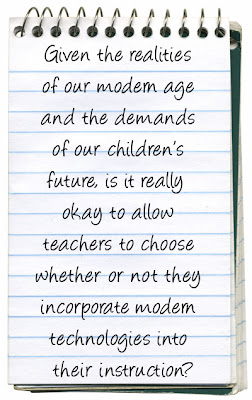Computers can transform the way students learn only if instructors change the way they teach.There it is in a nutshell. Instructors must change the way they teach. Connect that idea to this awesome graphic I saw on Miguel Guhlin's blog.
 It's obvious that technology is not going to go away. It is the future. It impacts everything in the world. Including our classrooms and students. So, no, technology can not be optional for our schools, districts or classrooms. We simply must start adapting our classrooms and instructional models to include these technologies. But that doesn't mean that we toss the technologies into the classrooms and hope for the best. We must support our teachers as they learn these new technologies. We must re-write our curriculum to support new types of learning experiences. We must integrate technology seamlessly into instruction, not make it an add-on, not see it as optional.
It's obvious that technology is not going to go away. It is the future. It impacts everything in the world. Including our classrooms and students. So, no, technology can not be optional for our schools, districts or classrooms. We simply must start adapting our classrooms and instructional models to include these technologies. But that doesn't mean that we toss the technologies into the classrooms and hope for the best. We must support our teachers as they learn these new technologies. We must re-write our curriculum to support new types of learning experiences. We must integrate technology seamlessly into instruction, not make it an add-on, not see it as optional. More highlights from the article:
- To productively use laptops in the classroom, teachers need to be willing to surrender their supremacy.
- Students no longer need us for the facts because facts are instantly available on the Internet. Instead, they need us to help them figure out what to do with all that data. It's ironic that law school professors are leading the laptop backlash, since their discipline saw this trend coming decades ago when they stopped trying to teach the law and focused instead on teaching legal reasoning.
- So what does a classroom look like when laptops have been successfully integrated?
- Students are working individually or in small teams to solve engaging problems or answer compelling questions.
- They are synthesizing their own experience, ideas from the professor, and sources that they can find on the Web.
- They are talking with classmates, but they are also collaborating with people outside the classroom walls by e-mailing experts, posting to blogs, or editing pages on wikis (websites that allow users to add, remove, or edit content).
- The teacher has come down from the lectern and is moving throughout the room, watching what students are doing, asking questions, posing challenges, and brushing shoulders with the student who just checked the scores on ESPN.com.
- Periodically the action is stopped. The teacher instructs the class to close their laptops, except perhaps one designated scribe. They talk. They share their insights, their solutions, and their obstacles. The Socratic exchange is fueled by the insights developed through electronic inquiry. The powerful face-to-face questioning isn't competing with the laptops; instead, it depends on it. When the dialogue ends, the teacher encourages students to reopen their notebook computers and summarize the important points of the conversation.
- Sometimes the instructor is delivering content, but more often the teacher is helping students learn how to learn.
- Students are working individually or in small teams to solve engaging problems or answer compelling questions.
- Instructional changes in today's classrooms need to be as radical as the technological innovations that spark them, and university administrators must recognize that upgrading the network won't deliver results without upgrading the instruction.
- Schools can't expect overburdened teachers to leap into the 21st century in their spare minutes, and faculty will need grants, time, and resources to advance their teaching.
- The best method for infusing technology into the curriculum is to support a few innovative teachers in developing new courses that use computers to enhance the academic culture of the school.
- In the long run, though, the strongest educational institutions won't be the ones that leave laptops out; they will be those that discover the most powerful ways to bring them in.
Wow! This article really gets it. And doesn't it make the future of learning in our classrooms sound so very exciting?!


No comments:
Post a Comment